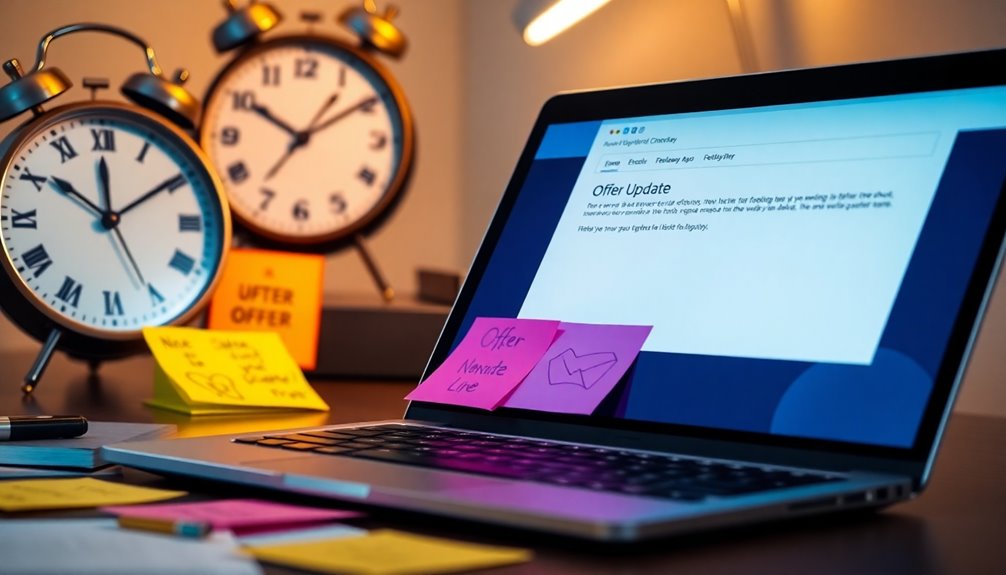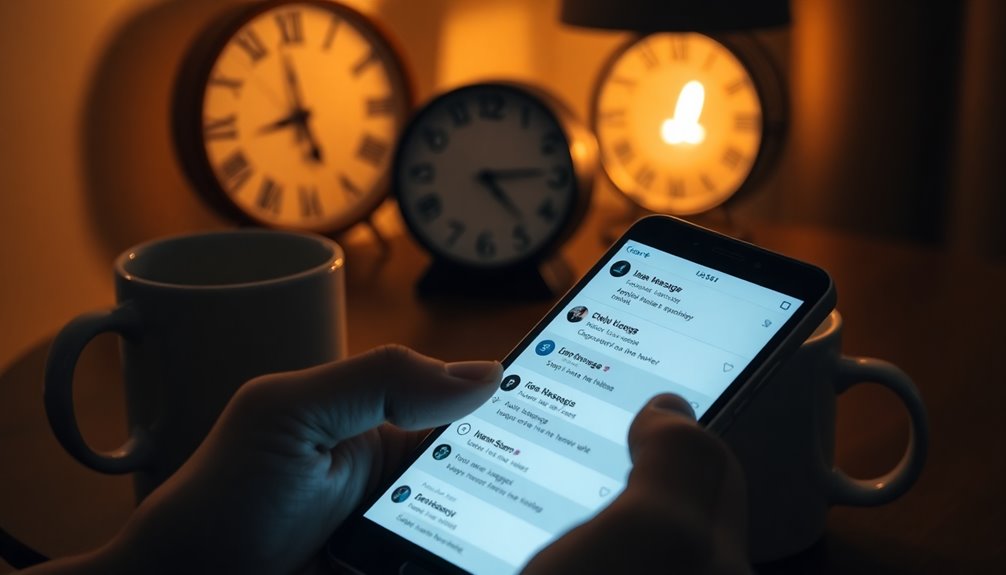When you're applying for jobs, you might find the waiting game surprisingly long. Around 37% of applicants hear back within a week, but many experience a wait of two weeks or more. Factors like high applicant volume and multiple interview stages can stretch this timeline. Additionally, internal approvals and company urgency vary widely. This uncertainty can lead to frustration and anxiety, but proactive follow-ups can ease the process. Understanding these dynamics not only helps manage your expectations but can also improve your chances of landing that offer. There's plenty more to uncover about making the wait work in your favor.
Key Takeaways
- 37% of applicants hear back within one week, but only 4% receive responses on the same day.
- Competitive roles may lead to longer wait times due to thorough evaluations and multiple interview phases.
- High applicant volume and internal approval processes can significantly slow down response times.
- Organizational urgency varies; some companies prioritize quick hires while others take a more measured approach.
- Proactive follow-ups after 1-2 weeks can help clarify your application status and manage expectations.
Understanding Hiring Timelines

Steering hiring timelines can feel like a waiting game, but understanding the typical response patterns can help ease your anxiety. When you're waiting to hear back after submitting an application, it's important to know that about 37% of applicants hear from employers within a week, while 44% get feedback within two weeks. Keep in mind, however, that only 4% receive responses in a single day, which highlights the variability in hiring timelines.
If you're juggling multiple job offers, knowing these timelines can be essential. Competitive roles often come with longer wait times since employers prioritize thorough evaluations of candidates. If you've nailed those job interviews, remember that organizations may take time to assess all applicants carefully. It's not just about you; they often have several candidates to take into account, which can delay decisions.
Understanding that an employer's urgency to fill a position can vary helps set realistic expectations. Instead of feeling anxious during the waiting period, focus on your next steps, and trust that the right opportunity will come your way.
Factors Impacting Response Delays

When you apply for a competitive role, you might find yourself waiting longer for a response. The internal processes within a company can also slow things down, as teams often need to discuss candidates before making a decision. Understanding these factors can help manage your expectations during the hiring journey.
Competitive Role Dynamics
In competitive roles, response delays can feel frustrating, often stemming from several critical factors. When you're in a job search for a highly sought-after position, you're not just competing against a few candidates; you're up against a high volume of qualified applicants. This influx can slow down the review process considerably, as hiring teams take their time to assess each candidate's qualifications thoroughly.
Another major contributor to delays is the internal decision-making processes within organizations. When companies are looking to fill high-stakes roles, they often require multiple interview phases. This can add time to the hiring timeline, as you may need to go through several rounds of assessments before receiving an offer.
Additionally, the urgency to fill these competitive roles varies from one organization to another. Some may move quickly, while others may take their time to guarantee they make the right choice. Balancing the pros and cons of each opportunity can also impact your decision on accepting a job offer. Understanding these dynamics can help you manage your expectations during the waiting period. Furthermore, having a solid retirement savings plan can provide peace of mind as you navigate this uncertain phase of your career.
Internal Processing Delays
Understanding the dynamics of competitive roles helps clarify why internal processing delays can greatly impact your job search. You might feel anxious as you wait, but remember that many factors contribute to these delays. Here are four key reasons:
- High Applicant Volume: When a role attracts many candidates, the review process slows considerably, making your wait feel endless.
- Multiple Interview Phases: Competitive positions often require several rounds of interviews, each adding to the overall response times.
- Internal Approvals: Companies must navigate discussions and approvals among team members, which can prolong decision-making.
- Organizational Urgency: While some companies prioritize quickly filling positions, others take a more measured approach, affecting how soon you'll hear back.
These internal processing elements can lead to frustrating delays. It's essential to keep this in mind during your job search, as these factors are often out of your control. Patience is key, but staying proactive—like following up politely—can sometimes help you gain clarity on where you stand in the process.
Effective Follow-Up Techniques

After submitting your application, it's crucial to stay proactive with follow-ups to keep your candidacy fresh in the employer's mind. Aim to send your first follow-up email 1-2 weeks after you've applied, especially if you haven't received any response. This email should express your continued interest and highlight why you'd be a great fit for the position.
If you still don't hear back after another week, don't hesitate to send a second reminder email. This indicates your enthusiasm and keeps your application on the employer's radar. Remember, hiring timelines can vary considerably, so a little patience goes a long way.
Maintain a concise and professional tone throughout your follow-up communications. This not only enhances your visibility but also helps foster a positive relationship with potential employers. By engaging with them through timely follow-ups, you can alleviate feelings of helplessness during the waiting period. After all, good news about accepting the job offer could be just around the corner, making the time spent waiting worthwhile. Your proactive approach can set you apart and keep the lines of communication open.
Emotional Effects of Waiting

Waiting for a job offer can stir up a whirlwind of emotions, leaving many feeling anxious and frustrated. The uncertainty of waiting periods takes an emotional toll, and it's common to experience a mix of feelings. Here are some emotions you might face during this challenging time:
- Frustration: Nearly 48% of job seekers report feeling frustrated while waiting, especially when communication is lacking.
- Anxiety: The stress of not knowing can lead to heightened anxiety, making each day feel longer.
- Helplessness: When you're left in the dark, it's easy to feel helpless about your situation.
- Hope: On the flip side, there's always a glimmer of hope that an offer is just around the corner.
Understanding that 44% of applicants hear back within two weeks can help set more realistic expectations. Taking proactive steps, like following up, can also alleviate some of these negative emotions by giving you a sense of control. Instead of letting the waiting period consume you, consider using this time to improve your skills and boost your confidence. Additionally, focusing on high vibrational energy can significantly impact your mindset and enhance your overall well-being during this waiting period.
Strategies to Enhance Offer Chances

While the emotional rollercoaster of waiting for a job offer can be overwhelming, there are effective strategies you can implement to boost your chances of securing that coveted position. Start by customizing your resume to align with specific job postings. This shows employers you're genuinely interested and have the right skills to include for the role.
Next, leverage your professional network for referrals. Candidates with connections often receive more attention, enhancing your chances to receive a job offer. After your interview, don't forget to send thank-you notes. These not only express your appreciation for their time but also reinforce your interest in the position, keeping you on the employer's radar.
Engaging in follow-up communications is another vital step. A simple message can demonstrate your enthusiasm and commitment, potentially influencing their decision-making process positively. Finally, familiarize yourself with typical hiring timelines; knowing that 44% of applicants hear back within two weeks can help you set realistic expectations and reduce anxiety during this wait. Implementing these strategies will greatly improve your odds of landing that job offer you desire.
Managing Multiple Job Offers

Maneuvering the landscape of multiple job offers can be both thrilling and intimidating. You now have the power to influence your future, but managing multiple job offers requires careful consideration. Here are four vital tips to help you navigate this exciting yet complex situation:
- Evaluate Company Culture: Choose a workplace that aligns with your values and aspirations to guarantee job satisfaction.
- Prioritize Growth Opportunities: Look for roles that promise personal and professional growth and development.
- Negotiate Effectively: Leverage your options to negotiate better terms for salary, benefits, and work-life balance.
- Stay Professional: Approach all communications with courtesy, as maintaining professionalism is essential, even if you decide to decline an offer.
When you're ready to accept a job offer, make certain it's the right fit for you. If it doesn't align with your goals, don't hesitate to explore your reasons for declining. Remember, this is your career journey—prioritize your happiness and future success! Additionally, consider how your employment decisions may impact your future retirement planning, as it can play a crucial role in your long-term financial security.
Importance of Communication and Transparency

Effective communication and transparency are essential in the job search process, as they can greatly impact your chances of landing the right offer. When you keep potential employers informed about other job offers, you create a sense of urgency that can expedite the hiring process. It's vital to choose the right moment to share this information, ensuring that your communication feels natural and timely.
Maintaining a positive and appreciative tone in your interactions fosters trust and respect, which can lead to better outcomes in negotiations. Clear and concise communication minimizes misunderstandings, enhancing the experience for both you and the employer. Remember, how you convey your decisions matters. If you need to decline an offer, expressing gratitude for the opportunity helps preserve relationships and keeps the door open for future prospects.
Ultimately, transparency is a two-way street. When employers feel you're honest and open, they're more likely to reciprocate. This mutual respect can lead to more favorable job offers and a smoother hiring process. By prioritizing communication and transparency, you're not just improving your chances of getting a job; you're building lasting professional relationships. Additionally, adopting a positive mindset can significantly enhance your approach to navigating the job market.
Frequently Asked Questions
How Long Is Too Long to Wait for an Offer?
When you're waiting for a job offer, it can feel like an eternity. Typically, you should expect to hear back within one to two weeks. If it stretches beyond that, it's reasonable to feel concerned. However, factors like high applicant volume or lengthy decision-making processes can cause delays. If you haven't heard anything after two weeks, consider sending a polite follow-up email to check on your application status.
Is No News Good News When Waiting for a Job Offer?
Like waiting for a letter from Hogwarts, no news can feel both magical and nerve-wracking. When you're waiting for a job offer, it's tough to interpret silence. While it might seem like good news, it often just means the company's decision-making process is dragging on. So, keep your hopes up, but don't assume you're in the clear. Staying proactive and considering other opportunities can help ease the uncertainty.
Why Is It Taking so Long to Get an Offer?
You might wonder why it's taking so long to get an offer. Several factors contribute to this delay. High applicant volumes can overwhelm hiring teams, stretching response times. If the role's competitive, expect longer waits as companies deliberate. Internal processes, like multiple interview stages, also slow things down. Finally, the urgency of filling the position varies by organization, leading to differing timelines. Setting realistic expectations can help ease your frustration during this waiting period.
How Long Does It Take to Get an Offer After a Final Interview?
Waiting for an offer after a final interview can feel like waiting for rain in a drought. Typically, you'll hear back within one to two weeks, with 44% of candidates getting responses in that timeframe. Only 4% receive feedback on the same day. Factors like competition and organizational processes can extend this wait. To stay on their radar, consider sending a polite follow-up about a week after your interview.
Conclusion
As you navigate the winding road of job hunting, remember that patience is your steadfast companion. Each moment of waiting can feel like an eternity, but it's also a chance to reflect and grow. Stay proactive, follow up thoughtfully, and keep the lines of communication open. With each step, you're not just waiting for an offer; you're crafting your future. So, when the call comes, you'll be ready to embrace the opportunity that awaits you.









